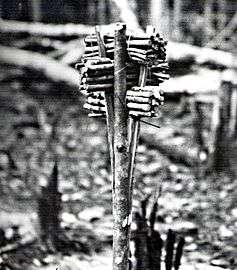Juju


Juju or ju-ju (French: joujou, lit. 'plaything')[1][2] is a spiritual belief system incorporating objects, such as amulets, and spells used in religious practice, as part of witchcraft in West Africa. The term has been applied to traditional African religions.[3]
The term "juju" and the practices associated with it, travelled to the Americas from West Africa with the influx of slaves via the Atlantic slave trade and still survives in some areas, particularly among the various groups of Maroons, who have preserved their African traditions.
Overview
Juju is sometimes used to enforce a contract or ensure compliance. In a typical scenario, The witch doctor casting the spell requires a payment for this service.[4]
Contrary to common belief, Vodun is not related to juju, despite the linguistic and spiritual similarities. Juju has acquired some karmic attributes in more recent times: good juju can stem from almost any good deed; bad juju can be spread just as easily. These ideas revolve around the luck and fortune portions of juju. The use of juju to describe an object usually involves small items worn or carried; these generally contain medicines produced by witch doctors.
The term "juju" also is used to refer to the juju bean native to West Africa. The poisonous bean grows on wild tree-dwelling vines.
The term "juju" is commonly used to refer to the feeling of something. For example, if a person feels offset by an object or place, they would say that the object or place has "bad juju."
References
- ↑ "Juju | Define Juju at Dictionary.com". Dictionary.reference.com. Retrieved 2013-07-05.
- ↑ Harper, Douglas. "juju". Online Etymology Dictionary.
- ↑ Mockler-Ferryman, Augustus (1898). Imperial Africa: The Rise, Progress and Future of the British Possessions in Africa. Imperial Press, limited. p. 392.
- ↑ "People & Power - The Nigerian Connection". Al Jazeera. 11 June 2012.